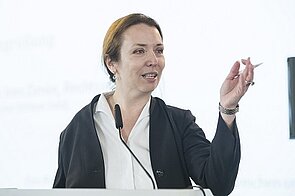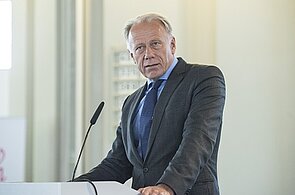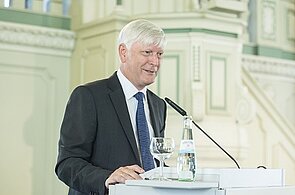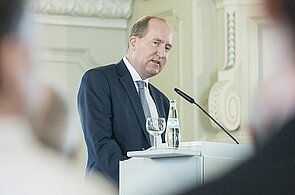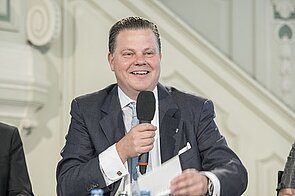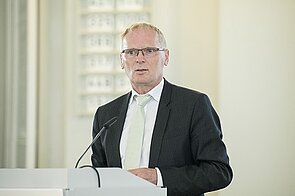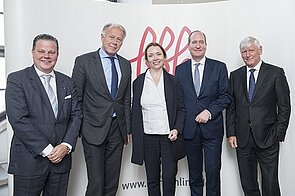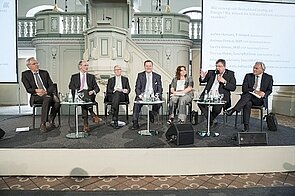27th BBH Energy Conference: The future of the energy transition
The energy transition is in full swing and a matter of concern to policymakers, the industry and science alike. In particular, the last couple of months have clearly shown that the political circles in Berlin have not yet reached a real consensus regarding the transition process. The possibilities, risks and especially the future design of the energy transition were the key issues discussed at the 27th BBH Energy Conference, which took place on 6 June in Berlin and attracted high-level speakers as well as numerous attendees with its diverse agenda.
After the welcome speech by BBH partner Dr. Ines Zenke in which she rejected the notion that the energy transition is about to fail (regardless of all the work still ahead), Jürgen Trittin, Member of the Bundestag and former Minister for the Environment, held a keynote speech pointing out that the energy transition is not a particularly German phenomenon. He stated that the use of nuclear energy is declining throughout Europe and that nuclear power is just no longer competitive. The energy transition had made renewable energy sources affordable across the world. “Renewable energy is booming all over the world”, said Mr Trittin. Germany was, however, currently offside and would have to make an effort to ensure that it does not fall behind other countries. Cutting the consumption of oil by 50%, that of coal by 50% and consuming 25% less natural gas by 2030 would only be possible if these cuts were compensated for by an ambitious expansion of renewable energy. The Coal Commission would also have to work out a specific phase-out strategy setting a specific exit date.
Dr. Rolf Martin Schmitz, CEO of RWE AG, stated in his presentation that the question was no longer “Will there be an energy transition?”, but rather “What will it look like?” He added: “The matter of nuclear energy is closed.” For a former nuclear power plant operator, this was a rather unexpected pronouncement – at least in terms of clarity. Dr. Schmitz said that in the area of climate protection, the energy industry had been a reliable partner for quite some time now. It was now high time for the transport sector, the building industry and the agricultural sector to make a contribution in this respect. As for security of supply, storage facilities and power-to-gas might play a leading role in the future, replacing part of the power plant fleet. The respective technologies would, however, have to be further advanced. Until then, it will principally be necessary to replace any capacity that is being decommissioned.
Dr. Joachim Lang, Director General of the Federation of German Industries (BDI), pondered the question as to how the industry will be able to shoulder the energy transition, as it was particularly fossil fuels that brought the industry to where it is today. According to Dr. Lang, the energy transition was now the attempt to put the industry on an entirely new footing. He called for more climate protection instead of political gestures. Other industrial countries would currently achieve far better results than Germany. In Mr. Lang’s view, the first step should be the advancing of technologies, not a decision in favour of a particular technology. He also spoke out against a ban on technologies. A strict focus on e-mobility, for example, would impose unnecessary limits. At the same time, resources would have to be distributed efficiently: Savings could be realised far more cost-effectively in the housing sector, by upgrading the energy performance of buildings, than in the automotive sector.
An inspiring morning session with animated and in-depth discussions about the Coal Commission, the potential in the housing sector that is not yet leveraged, a look at foreign trade and many other topics was followed by a lunch break during which the participants enjoyed the traditional organic currywurst, a typical Berlin dish, as well as many a conversation. BBH partner Prof. Held then kicked off the second half of the conference, which was marked by a lively panel debate with, among others, the Federal Network Agency’s President Jochen Homann and which also involved the audience.
Mr Homann, pointed out a principal regional problem for security of supply: Excess capacities in the North, electricity deficits in the South. He stated that the 65% renewable energy target also impacts the grid infrastructure which is already under pressure. In 2017 alone, €1.4 billion had been necessary for redispatching. Thomas Weber, Managing Director of EAM GmbH & Co. KG, also reminded the audience that grids are an important component of the energy transition: Without grid stability there would not be a reliable energy supply. Particularly the distribution system, to which most of the renewable energy installations are connected, depends upon the necessary competences and data in order to provide ancillary services.
Of course, grid stability also has a financial component: Investment incentives hinge on returns. According to BBH partner, public auditor and tax advisor Rudolf Böck, the returns that can be achieved on the basis of the rate of return on equity as stipulated by the Federal Network Agency are too low to stimulate the necessary investments. “The grid operators need investment security rather than legal disputes”, said Mr Böck. He also suggested that it was necessary to examine whether the current regulatory framework, which principally rules out alternative funding options, was not actually outdated. Mr Homann replied, with a small wink perceptible at least for the participants in the front row, that legal certainty could also be attained by accepting the rulings of the Federal Network Agency instead of challenging them in court.
There was some controversy over the role that gas will play as a source of energy in the future. While Andreas Rimkus, Member of the Bundestag (SPD), stated that gas will be the fuel of the future, Johannes Lackmann, Managing Director of WestfalenWIND GmbH, spoke in favour of more electrification. Mr Lackmann suggested that a more dynamic approach should be taken in regard to electricity price components in order to increase flexibility regarding renewable energy sources and thus to facilitate their use in other sectors such as the heat market. Sandra Weeser, Member of the Bundestag (FDP), emphasised that the electricity price must also be affordable.
Throughout the day and also in this context, the effects of the RWE/E.ON deal on the market were being discussed. While Mr Weber considers E.ON to be a large fellow player of distribution system operators based on the company’s stakes in grid infrastructures, he also added that there might be a potential concentration of “buying power” vis-à-vis service providers. Mr Homann rather nonchalantly dismissed this statement, arguing that competition would be protected by the Federal Cartel Office and the grids would be subject to regulation by the Federal Network Agency.
Whether it really is as simple as that remains to be seen and will be discussed at the next energy conference of BBH at the latest.
Contact:
Dr. Ines Zenke
Lawyer, Partner
Tel +49 (0)30 611 28 40-179
ines.zenke(at)bbh-online.de
Visit Becker Büttner Held online at www.bbh-online.de, www.derenergieblog.de or twitter.com/BBH_online.

